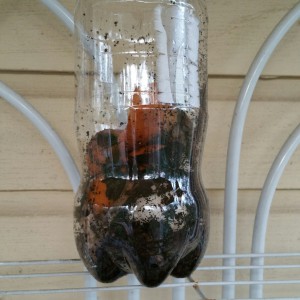
A two liter soda bottle with the top cut off makes a great mini compost bin. This is a a new batch with soil mixed in to experiment with jumpstarting the composting process.
With the promise of fresh vegetables just around the corner, now is a great time to think about starting a compost pile to save money on fertilizer and potting soil for your garden. Composting makes an excellent (and environmentally friendly) project for youth. It can save you money on commercially sold soil amendments as well as improving the quantity and quality of your vegetable harvest. Compost is simply organic material that has been broken down by living organisms until it can be used by plants as nutrients. This decomposed material is called humus and it is a great natural fertilizer. All that you need to get started composting are a few key ingredients:
- An even mix of nitrogen rich “green” organic materials and carbon rich “brown” organic materials. Greens include items like fresh grass clippings, manure and vegetable scraps from the kitchen. Browns are things like dead leaves, straw, or newspaper.
- Moisture is needed for the organisms that break the compost down to live, but not too much. The pile should be damp, not soggy.
- Air should be introduced to the compost periodically by mixing it up.
- Time is necessary for microorganisms to turn the brown and green materials into humus.
There are several methods of composting, from something as simple as a pile in a corner of your yard to a commercially sold rotating bin. Whatever composting system your group chooses the basic method of creating a good composting mixture is the same. Simply make even layers of browns and greens and moisten the pile slightly with water. Over the course of the next few weeks, microorganisms will begin decomposing the mixture, releasing heat as a byproduct. Temperatures will sometimes to as high as 140° F. The mixture will reduce in volume by nearly half as it breaks down. Once the mixture is entirely composted it will be close to ambient temperature and will resemble fine dark rich soil with some large clumps. To test the compost, plant a few fast growing radish seeds in it. If they don’t grow or are unhealthy it means bacteria are still decomposing the compost mixture and competing with the plants for nutrients. If the plants are healthy the mixture is ready to use in the garden either by spreading it like a mulch, mixing it into the soil or making a compost tea.

A two liter soda bottle with the top cut off makes a great mini compost bin. This is a a new batch with soil mixed in to experiment with jumpstarting the composting process.
As an alternative to a large compost pile or bin you can create mini compost mixtures in a variety of recycled containers, such as a mason jar or empty 2-liter bottle. These are great for small classroom projects, science experiments and take home projects. Make sure to that the compost can be mixed and is getting air. Keep it in a sunny spot so it is warm enough for the microbes to work. Here are some ideas to extend this activity into a project to learn the science behind composting:
- Help youth research composting methods and choose the best one for them. Encourage them to consider things like cost, labor and time when deciding the best method.
- Try different types of composting methods and mixtures. Have the youth make predictions about which mixture will be the most effective. Have them design an experiment to find out what happens if more greens are in a composting mixture than browns? Or, why would one method decompose faster than the other? What is the fastest method of composting?
- Keep records and observations about the compost as it decomposes. By measuring factors like temperature, texture, smell and look youth learn the value of recordkeeping as they use the data they collected to research the best composting methods.
- Have the finished compost soil tested. Ask your county 4-H Agent to invite a UF/IFAS Agriculture or Horticulture Agent to help perform the test and explain the results to the group.
For more resources to help your club or group to learn composting by doing visit these sites:
- UF IFAS Factsheet- Composting for the Home Gardener
- Florida’s Online Composting Center
- UF/IFAS Florida Friendly Gardening, Gardening in a Minute- Composting
Do you have a passion for gardening that you would like to share with others? Last year, nearly 20,000 youth participating in the 4-H Gardening Project. This would not have been possible without our 4-H volunteers. If you would like to help the next generation develop gardening skills and an appreciation for agriculture and the environment, consider becoming a volunteer. To find out more, contact your local UF IFAS Extension Office, or visit http://florida4h.org/volunteers.
Your opinion matters! Take this short survey to help us improve our blog https://ufl.qualtrics.com/SE/?SID=SV_3gtLKjqia3F75QN.
- The Impact Ag Judging Had on Me - October 6, 2016
- Follow the 5 D’s of Mosquito Prevention! - February 26, 2016
- 4-H Club Leader Grows Resilience and Empathy - November 13, 2015
